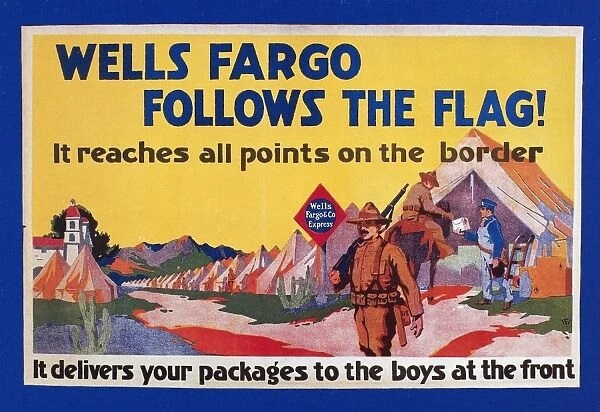
Word of the Day: Enmity
Today’s word of the day, courtesy of the Word Guru’s daily email, is enmity. Enmity is a noun which means “a feeling or condition of hostility; hatred; ill will; animosity; antagonism” (https://www.dictionary.com/browse/enmity). It can also mean “the targeting for attack of a player character by an enemy, and the circumstance-specific strength of that targeting for any particular character,” but that definition is specific to video games (ibid.).
The word entered the language in the “late 14c., ‘hostile feeling, rivalry, malice; internal conflict,’ from Old French enemite, variant of enemistié ‘enmity, hostile act, aversion’ (Modern French inimité), from Vulgar Latin *inimicitatem (nominative *inimicitas), from Latin inimicitia ‘enmity, hostility,’ usually plural, from inimicus ‘enemy’” (https://www.etymonline.com/search?q=enmity). The website also says that “Amity is basically the same word without the negative prefix.”
On this date in 1852, Henry Wells and William G. Fargo decided to launch a business.
In 1848, gold was discovered in the hills of California, and the gold rush of ’49 was on: “On August 19, 1848, the New York Herald was the first major newspaper on the East Coast to report the discovery of gold. On December 5, 1848, US President James K. Polk confirmed the discovery of gold in an address to Congress. As a result, individuals seeking to benefit from the gold rush—later called the ‘forty-niners’—began moving to the Gold Country of California or ‘Mother Lode’ from other countries and from other parts of the United States” (https://en.wikipedia.org/wiki/California_gold_rush). And with the news of the gold, some 300,000 people made their way to California.
Wells and Fargo had both owned their own companies, Wells and Company and Livingstone, Fargo and Company, and along with John Warren Butterfield, they had merged their businesses to form American Express in 1850. These were what were called cash-in-transit companies, companies that handle the moving of money among places.
Wells and Fargo’s new business venture was to provide express and banking services to California, and that included delivering gold from California back to Philadelphia, where the mint was. They also delivered mail and supplies to California. They worked with Butterfield, whose Butterfield Line (Butterfield Overland Mail) ran from the Southeast to San Francisco. In 1866, Wells and Fargo merged with Butterfield and another company to form Wells Fargo.
In 1905, Wells Fargo separated its express business from its banking business. It worked out well for the banking side—it’s now Wells Fargo Bank, and it’s one of the biggest banks in the country. But during the First World War, the federal government nationalized the Wells Fargo express business and created a government agency called the US Railway Express Agency. Woodrow Wilson first nationalized the railways, supposedly in response to a coal shortage. The Agency created the American Railway Express Company, a government-mandated monopoly. But the AREC lasted only until 1975: “From 1969 to the end in 1975, REA Express, Inc. lost an average of $50,000,000 ($399,001,815 in 2022) every year. On February 18, 1975, REA Express, Inc. filed for Chapter 11 bankruptcy, blaming: high inflation, lack of available credit, a downturn in express shipments and losses due to continued issues with railroads. In June 1975, wildcat strikes occurred at facilities in New York City, Chicago, St. Louis Kansas City, Philadelphia and Oklahoma in reaction to bankruptcy reorganization efforts during the preceding months, including a 10 percent paycut, the dismissal of 3,200 employees and closure of 114 terminals. Despite reorganization efforts, the company wouldn’t last long, collapsing eight months later on 6 November 1975” (https://en.wikipedia.org/wiki/Railway_Express_Agency).
But it got worse: “In 1978, former REA Express president and CEO Tom Kole would be indicted of six counts in federal court: Three counts of embezzlement, two counts of making false statements to the Interstate Commerce Commission, and one count of conspiracy. Kole, along with others, were accused of embezzling over $100,000 ($543,847 in 2022) from REA Express during its final years. Kole was sentenced to two years in prison in early 1978 after pleading guilty to the conspiracy charge on 16 January 1977” (ibid.).
Some Americans are appalled by the control of large corporations, like Wells Fargo Bank. Others are appalled by the control of government agencies. I feel a bit of enmity toward both.
Today’s image is of a “Banner for Wells Fargo & Co Express, 1916, promising parcel delivery to troops in the Mexican Expedition against the forces of Pancho Villa” (https://www.mediastorehouse.co.uk/granger-art-on-demand/vintage-ads/mexican-expedition-1916-banner-wells-fargo-6512421.html).